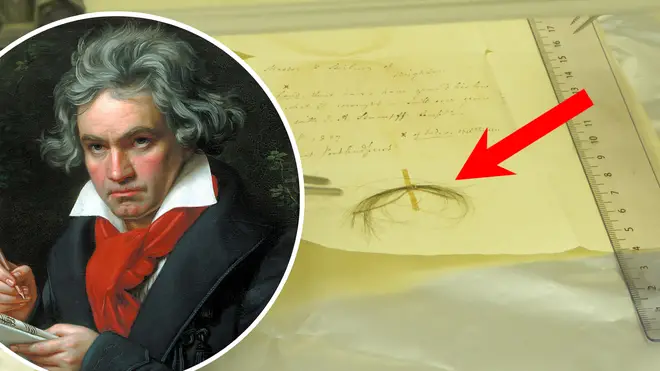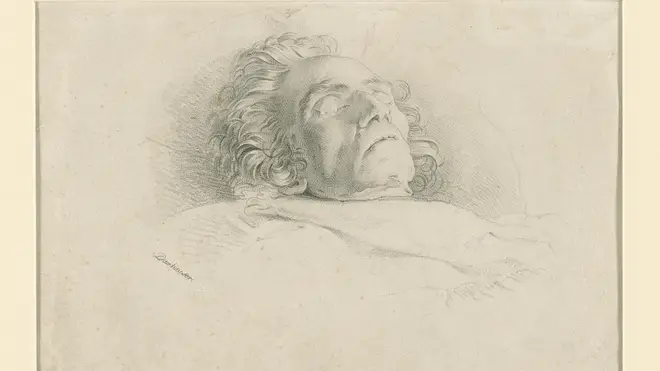Scientific analysis of Beethoven’s DNA reveals he had Hepatitis B and high risk of liver disease
22 March 2023, 20:44

Beethoven expert John Suchet describes the discovery as “the most exciting news to come out about Beethoven’s health for 20 years”.
Listen to this article
An international team of scientists have examined the locks of the legendary composer, Beethoven, to try and uncover the secrets of his genetic makeup.
In the study, scientists set out to unveil the mystery of Beethoven’s deafness, along with answers to other conditions the composer is thought to have suffered from.
Using the DNA found in five locks of Beethoven’s hair – all taken from the last seven years of the composer’s life – the scientists discovered that the 18th-century German composer was “predisposed to liver disease, and infected with Hepatitis B”.
The cause of Beethoven’s death has never been proven, but the scientists suggest that these newly discovered factors, combined with his alcohol consumption, may be the reason he died from liver failure aged 56.
Classic FM presenter and Beethoven scholar John Suchet has described the findings as “the most exciting news to come out about Beethoven’s health since the testing of a lock of hair 20 years ago which revealed high levels of lead in his blood at his death”.
Read more: If Beethoven was completely deaf, how did he compose music?

“Beethoven suffered from digestive problems for much of his adult life,” Suchet told Classic FM. “There has been speculation he may have had Irritable Bowel Syndrome or Diverticulitis.
“This latest research, pointing to liver disease and Hepatitis B, brings us closer to establishing the cause of his problems.”
The research, published today in Current Biology, was led by the University of Cambridge, the Beethoven Center San Jose and American Beethoven Society, KU Leuven, FamilyTreeDNA, the University Hospital Bonn and the University of Bonn, the Beethoven-Haus, Bonn, and the Max Planck Institute for Evolutionary Anthropology.
Its primary aim was to learn more about Beethoven’s health problems, including the composer’s chronic gastrointestinal complaints, and severe liver disease. Reports show that from his early 20s, the composer was suffering frequently from diarrhoea and abdominal pain, which continued to affect him for the rest of his life.
Beethoven himself even said he composed the fourth movement of his second symphony as a musical description of his bowel rumblings.
Read more: Listen to this 10,000-strong Japanese megachoir sing Beethoven’s ‘Ode to Joy’

Beethoven: Symphony No. 4, 2nd movement | Paavo Järvi and the Deutsche Kammerphilharmonie Bremen
Lead author Tristan Begg, from the University of Cambridge, added that the composer’s alcohol consumption most likely affected his health. Beethoven had two attacks of jaundice during his lifetime, and is thought to have died due to liver cirrhosis.
“We can surmise from Beethoven’s ‘conversation books’, which he used during the last decade of his life, that his alcohol consumption was very regular,” said Begg, a final year Biological Anthropology PhD researcher. “Although it is difficult to estimate the volumes being consumed.
“While most of his contemporaries claim his consumption was moderate by early 19th century Viennese standards, there is not complete agreement among these sources, and this still likely amounted to quantities of alcohol known today to be harmful to the liver.
“If his alcohol consumption was sufficiently heavy over a long enough period of time, the interaction with his genetic risk factors presents one possible explanation for his [liver disease].”
Read more: 10 works of Beethoven that actually changed the world

Pianist creates mesmerising visualisation of Beethoven’s Moonlight Sonata
Alongside these health issues, the study aimed to shed light on Beethoven’s progressive hearing loss, which also began in his mid-to-late-twenties.
By 1818, the composer was functionally deaf, and scholars have long mused on the connections between his loss of hearing and over health conditions, which Suchet names as “the greatest medical mystery in the history of the arts”.
While the study did not reveal the reason for Beethoven’s deafness, Dr. Axel Schmidt at the Institute of Human Genetics at the University Hospital of Bonn said that further research could not be ruled out from these DNA samples as genome technology is ‘steadily improving’.
“It is therefore possible that Beethoven’s genome will reveal hints for the cause of his hearing loss in the future,” Dr Schmidt wrote.

Beethoven’s hearing loss remains a mystery – but there has also been a new question raised by the study.
When conducting research on the hair samples, the scientists compared Beethoven’s DNA to the genetics of the composer’s living relatives in Belgium.
However, they could not find matches among either of them, leading the researchers to believe that Beethoven is likely to have had an extramarital affair within Beethoven’s direct paternal line.
Begg however, is undeterred by these two unanswered questions of Beethoven’s hearing loss and potential extramarital relations, and said that he and his team “hope that by making Beethoven’s genome publicly available for researchers, and perhaps adding further authenticated locks to the initial chronological series, remaining questions about his health and genealogy can someday be answered”.
196 years after the composer’s death, there is obviously still a healthy desire to learn as much as possible about this musical legend.


























